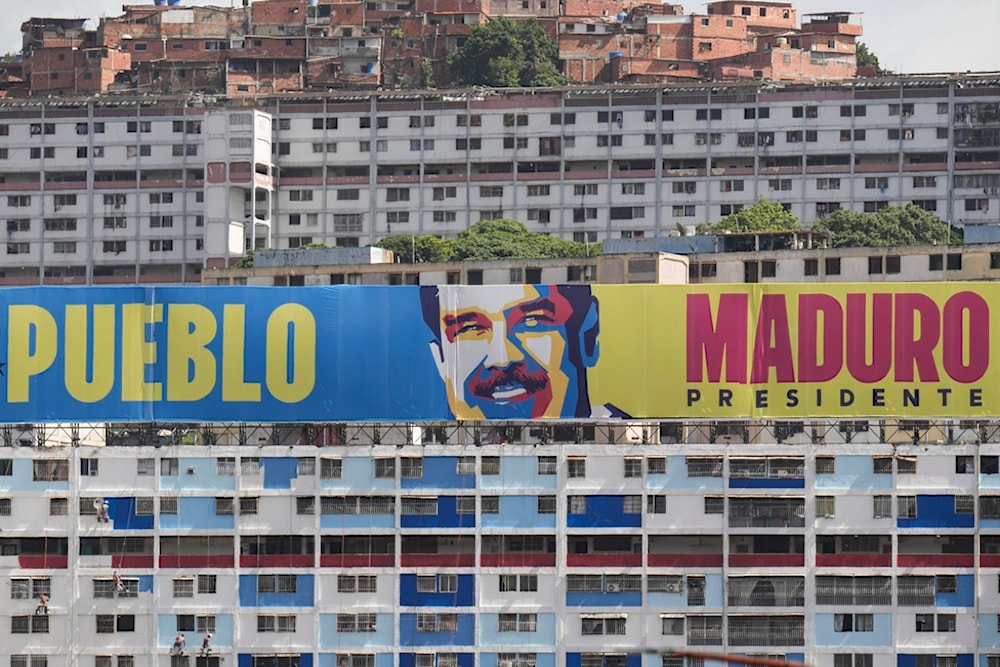US sanctions on Venezuela caused crises 3x worse than Great Depression
A study by The Washington Post shows the impact of US sanctions on Venezuela and other nations, highlighting their failure to achieve their objectives.
-

A campaign banner promotes President Nicolas Maduro in Caracas, Venezuela, on Saturday, July 27, 2024. (AP)
Sanctions imposed by the United States on Venezuela have provoked crises three times more severe than those witnessed during the Great Depression, a Washington Post study found.
As the United States deepens the economic punishment of Venezuela, while the European Commission continues levying sanctions as part of its foreign policy, the Latin American nation is forced into a "perpetual economic war."
The authors of the study, Jeff Stein and Federica Cocco, detailed that the US administration imposes three times more sanctions on overseas countries than any other nation, international organization, or coalition. The forced economic punishment impacts one-third of the globe's nations.
The study further focused on US sanctions on Venezuela, imposed during Donald Trump's presidency in 2017 until 2021. The purpose was to undermine Nicolas Maduro's leadership and empower the opposition, an objective that not only failed but also garnered a wave of backlash for triggering one of the worst peacetime economic crises in modern history.
Drawing comparisons to other countries where the US clawed its sanctions, such as Syria, the DPRK, Cuba, and Iran, the authors note that sanctions did not achieve the desired political objectives, but their impact was manifested in humanitarian punishment.
Officials within the US government warned of the consequences of sanctions or their excessive usage. However, the Biden administration continued utilizing sanctions as a political tool and imposed over 6,000 sanctions in two years, distributed on Russia and several other global targets.
How the US exploits its global influence to punish sovereign economies
The Washington Post's analysis underscores the intricate power and dependency relationships within the modern global financial system, where the US dollar holds a central and decisive role.
It emphasizes that the US Treasury Department, which oversees the regulation of the country's financial system, has effectively become the "guardian of global banking operations." This position grants the United States considerable influence over international financial transactions.
The study lastly asserts that while sanctions are a significant instrument of US foreign policy, their unintended consequences and humanitarian impacts are undeniable. Wally Adeyemo, the Undersecretary of the Treasury, is quoted in the article as saying that sanctions "are an important tool to help promote national security, but they should only be used as part of a broader foreign policy strategy."
In this context, journalist Jeff Stein, in an article published on July 26, noted that former President Donald Trump was cautioned that severe sanctions against Venezuela could accelerate an exodus of millions of migrants to neighboring nations, according to three current and former US government officials.
Despite these warnings, Trump proceeded to impose some of the harshest economic sanctions in American history on Venezuela.
No sanctions will be able to defeat Venezuela: Maduro
In this context, Venezuelan Foreign Minister Yvan Gil, speaking at the 89th Plenary Meeting of the UN General Assembly, affirmed that Washington and its European allies are using sanctions as a geopolitical weapon.
He stated that these actions "represent a serious violation of international law and an act of aggression against sovereign nations."
When the Biden administration reimposed sanctions on Venezuela, mainly targeting its oil industry, President Nicolas Maduro blasted the decision as a "grave mistake".
"We do not need a license to grow, to work, we are not slaves, at what point did we become a gringo colony, Venezuela produces with its own hands," Maduro stressed on the occasion of the inauguration of the I ExpoVenezuela Produce 2024 Meeting.
He stressed that "there is no sanction, there is no threat that today will harm the effort to build a productive economic model, we only depend on our work and the union we have."
"Neither sanctions, nor threats, nor conspiracies, nor corrupt, nor traitors will be able to. No one has been able to, nor will anyone be able to defeat Venezuela," he was quoted as saying.

 4 Min Read
4 Min Read








